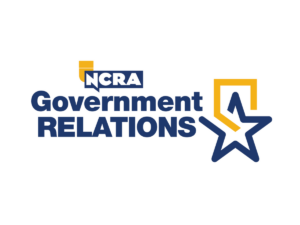
An Oct. 1 article in the ABA Journal asked if the coronavirus pandemic will cause a major shift in how courts handle keeping a record of proceedings. NCRA President Christine Phipps, RPR, responded by sharing the many reasons that court reporters continue to be the gold standard.
The following is her response:
We appreciate your insights into how the current pandemic has caused so many shifts in the way the judicial system is having to function in today’s mostly remote environment that were noted in the article in the ABA Journal dated Oct. 1 and entitled, “Will court reporting undergo a pandemic shift?”
On behalf of the more than 13,000 members of the National Court Reporters Association (NCRA), the country’s leading organization representing stenographic court reporters, captioners, and legal videographers, I would like to take this opportunity to share further with you and your readers why using a human court reporter versus any artificial intelligence (AI) system is vital to not only ensuring that an accurate record is made but also ensuring that participants in any legal proceeding have access to that accurate record.
We should not underestimate the role of the court reporter in an era when we are increasingly dependent on technology. Stenographic court reporters remain the gold standard for capturing the spoken word. It’s not just that they produce the most accurate legal records, including capturing certain interpersonal nuances that digital recordings might miss. Nor is it simply because they are trained to handle complex procedures associated with trials and depositions. Court reporters are indispensable to the legal system because they offer 21st–Century solutions to unyielding situations that demand speed without sacrificing accuracy. Rather than relics of a bygone era, they provide high-tech solutions to our increasingly virtual society.
Today’s court reporters process their shorthand through computers to provide judges, attorneys, and clients with instantaneous, understandable transcripts. No AI technology can come close. Traditionally, stenography is expanded into a readable transcript following the day’s events. But realtime uses computer software that now instantaneously translates shorthand into understandable English. The text then scrolls across the laptop or tablet, much like captioning on a television.
Your article suggests that the use of remote video platforms and AI technology in the courtroom have emerged as two solutions to address both the shortage of court reporters and the need for social distancing. I agree that remote video platforms address the solution for social distancing, and in most instances during the pandemic, the stenographic court reporter working remotely through the use of these video platforms has been the only solution for the administration of justice. This is especially true since courthouses that installed audio recording systems rendered themselves inoperable during the pandemic with no staff able to operate the equipment located at the courthouse.
Remote video platforms also have been a solution for stenographic court reporter coverage for proceedings in remote areas with a generally low-density resident population to begin with, such as the Florida Keys. The forced pivot of the entire judicial system to remote video platforms, a system otherwise traditionally behind the curve in the advancement of technology, will allow for a much needed broader acceptance for all of us to work remotely, including but not limited to the stenographic court reporter.
AI lacks the cognitive human element and cannot replace the highly honed skills of a live court reporter to provide an accurate record. AI, in the instance of automatic speech recognition (ASR), is cloud-based and works as follows: The ASR function takes an audio recording of, for example, a deposition that is confidential unless and until filed with the court and feeds that recording into a cloud database, sometimes located outside the confines of U.S. law. The audio is then taken and fed through software trying to distinguish what is said.
It is imperative to understand that many times in the courtroom peoples’ lives are on the line, that every single word matters, and that is the ethical responsibility that guides stenographers in every single proceeding. Stenographers are far more experienced and capable than ASR in making the record, with overlapping speakers, coughs, and noises that obscure spoken words, mumbling, thick accents, and voices that sound alike, which the stenographer better identifies by being present, than ASR can. Only a human being, charged with care of the record, is capable of instantly determining unintelligible speech and pausing the proceedings for clarification. Only court reporters can provide a realtime display of the transcript that has the added value of being able to resolve potential misunderstandings in real time.
When using audio recording and then using ASR to transcribe or some other transcriptionist, there is an inherent issue with certifying the record. A stenographer includes a certificate page with every transcript, certifying that the transcript is a true record of their stenographic notes. There are many examples of depositions that have been thrown out of legal proceedings because they were not transcribed by the person present in the room who pushed the record button and monitored the proceedings.
Even in courts that have been forced to implement other methods of recordkeeping, court reporters nearly always remain in place for complex civil litigation and felony criminal proceedings, because they are the most reliable in high-stakes situations. Likewise, in the deposition setting, outside of the courts, where true market demand is at play, court reporters remain the overwhelming choice for attorneys because they know there is no substitute for what we do.
We support the goal of improvement within the legal system to protect the rights of those in the system. Court reporters are the last line of defense for the public against process abuse. The trial is only as good as the record of trial. Our absolute devotion to impartiality and accuracy is designed to ensure a reliable record for readers one day or one hundred years later.
Protection of the measured and faithful administration of justice is the basis for court reporters’ very presence in the judicial process. Our system of jurisprudence demands that justice be blind, but justice cannot be deaf. We offer our support and expertise for opportunities that help to ensure that words spoken on the record are accurately preserved.
As a further note, the stenographic writer depicted in the photo is more than 50 years old. Stenographic machines, like cars and technology in general, are far more computerized and advanced than their 50-year-old ancestors. Please reach out to NCRA in the future for photos for your articles that depict our current state-of-the-art technology.
Again, on behalf of the more than 13,000 members of NCRA, I want to thank you for this opportunity to speak with you as to why court reporters cannot and should not be replaced by AI systems when it comes to capturing an accurate record. I would be happy to speak with you more about this issue and hope you will reach out, and at a minimum to fact-check articles having to do with the court reporting profession, as NCRA is the association that has represented court reporters for the last 121 years.
Sincerely,
Christine Phipps, RPR
NCRA President



[…] what critics might say about AI voice-to-text potentially replacing stenographers, AI can’t understand the specific context of detailed conversations. One popular example of […]
[…] what critics might say about AI voice-to-text potentially replacing stenographers, AI can’t understand the specific […]